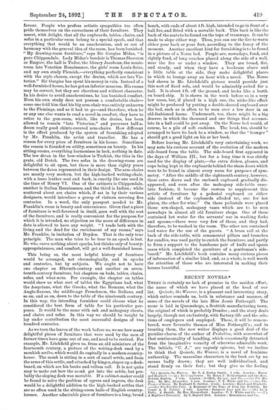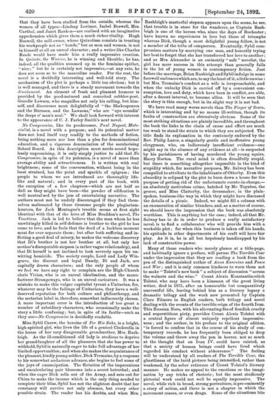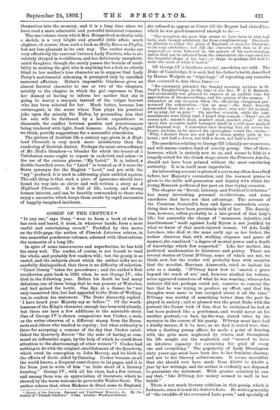RECENT NOVELS.•
THERE is certainly no lack of promise in the maiden effort, the name of which we have placed at the head of our list. Quixote, the Weaver, is a pleasant and interesting story, which rather reminds us, both in substance and manner, of some of the novels of the late Miss Jessie Fothergill. The scene is laid in Qneenshope, a Scottish manufacturing town, the original of which is probably Dundee ; and the story deals largely, though not exclusively, with factory-life and the rela- tions of employers and employed. These, it will be remem- bered, were favourite themes of Miss Fothergilrs ; and in treating them, the new writer displays a good deal of the peculiar charm of the author of Probation, with somewhat of that sentimentality of handling, which occasionally detracted from the imaginative veracity of otherwise admirable work. The initials, "C. J.," are vaguely epicene, but we incline to think that Quixote, the Weaver, is a novel of feminine authorship. The masculine characters in the book are by no means badly drawn ; they are well individualised, and stand firmly on their feet ; but they give us the feeling *(L) Quixote, the Weaver. By 0. J. Farley Smith. 3 vols. London : Hurst. and Blackest.—(2.) No Compromise. By Helen F. Hetherington and the Rev. Darwin Burton. 3 vols. London : Griffith, Ferran, and 0o.--(3.) Far His Sake. By Mrs, Alexander. 3 vole. London : F. V. White and Co.—(t ) The Finger of Scorn. By Reginald E. Salwey. 2 vols. London : Hurst and Blackett. —(5.) The Terrible Czar. A Romance of the Time of Ivan the Terrible. By Count A. X Tolstoi. 2 vole. London: Sampson Low and Co.—(8.) Lary Patty. A Sketch. By Mrs. Hungerford. London : F. V. White and Co. — (7 .1 Highland Chronicle. By S. Bayard Dod. London : Hutchinson and Co.
that they have been studied from the outside, whereas the women of all types—Lindsay Lorimer, Isabel Boswell, Mrs. Carthal, and Janet Ranken—are realised with an imaginative apprehension which gives them a much richer vitality. Hugh Boswell, the mill-owner, whose Quixotism consists in treating his workpeople not as " hands," but as men and women, is not in himself at all an unreal character; and a writer like Charles Beads would have made him a really impressive creation. In Quixote, the Weaver, he is winning and likeable; he has, indeed, all the qualities summed up in the feminine epithet, " nice; " but he is certainly not impressive,—at any rate, he does not seem so to the masculine reader. For the rest, the novel is a decidedly interesting and well-told story. The mechanism of the plot is perhaps a little too obvious ; but it is well managed, and there is a steady movement towards the denoilement. An element of fresh and pleasant humour is provided by the good-natured and conceited cobbler-poet, Geordie Lawson, who magnifies not only his calling, but him- self, and discourses most delightfully of " the Shakespeares and the Burnses, and the Lawsons," who are "aye soundin' the deeps o' man's soul." We shall look forward with interest to the appearance of C. J. Farley Smith's next novel.
No Compromise, like its predecessor, Paul Nugent, Mate- rialist, is a novel with a purpose ; and its polemical matter does not lend itself very readily to the methods of fiction, being nothing more nor less than a plea for denominational education, and a vigorous denunciation of the secularising School Board. As this description must needs sound hope- lessly unpromising, it is only simply justice to add that No Compromise, in spite of its polemics, is a novel of more than average ability and attractiveness. It is written with real brightness ; some of the conversation, without being in the least strained, has the point and sparkle of epigram ; the people to whom we are introduced are thoroughly life- like and natural ; and in every part of the book, with the exception of a few chapters—which are not half so dull as they might have been—the powder of edification is well neutralised by the jam of entertaining narrative. The authors must not be unduly discouraged if they find them- selves maltreated by those tiresome people the plagiarism- hunters, for Jack Montague's trouble seems at first sight identical with that of the hero of Miss Braddon's novel, The Venetians. Jack is led to believe that the man whom he has unwittingly killed in self-defence is brother to the girl he has come to love, and he feels that the deed of a luckless moment must for ever separate them ; but after both suffering and in- flicting a good deal of misery, he makes the welcome discovery that Di's brother is not her brother at all, but only her mother's disreputable stepson (a rather vague relationship), and that Di herself is not inclined to look severely upon his un- witting homicide. The society couple, Lord and Lady Win- grave, the discreet and loyal Dandy, Di and Jack, are capitally drawn characters ; and the only people of whom we feel we have any right to complain are the High-Church cleric Vivian, who is an unreal idealisation, and the manu- facturer Strangeways, who is an unreal caricature. It was a mistake to make this vulgar capitalist tyrant a Unitarian, for, whatever may be the failings of Unitarians, they have a well- deserved reputation for both culture and philanthropy, and the sectarian label is, therefore, somewhat indiscreetly chosen. A more important error is the introduction of too great a number of subsidiary characters, who occasionally make the story a little confusing ; but, in spite of its faults—such as they are—No Compromise is decidedly readable.
Miss Sybil Carew, the heroine of For His Sake, is a bright, high-spirited girl, who lives the life of a genteel Cinderella in the house of her very disagreeable grandmother, Mrs. Rash-. leigh. As the ill-conditioned old lady is studious to deprive her granddaughter of all the pleasures that she has power to withhold, Sybil is naturally eager to take full advantage of her limited opportunities ; and when she makes the acquaintance of the pleasant, kindly young soldier, Dick Tremaine, by a response to his somewhat audacious advance, she begins to feel some of the joys of emancipation. The flirtation of the impecunious and uncalculating pair blossoms into a secret betrothal; and when the eager Dick sells out of the Army, and sets out for China to make the income which is the only thing needed to complete their bliss, Sybil has not the slightest doubt that her constancy will survive not only absence, but every other possible strain. The reader has his doubts, and when Mrs. Rashleigh's masterful stepson appears upon the scene, he see, that trouble is in store for the wanderer, as Captain Rash- leigh is one of the heroes who, since the days of Rochester ; have known no experiences in love but those of triumphs whereas Dick, though a most delightful young fellow, is not a member of the tribe of conquerors. Eventually, Sybil com- promises matters by marrying one man, and honestly trying her best to forget that she has transferred her love to another ; and as Mrs. Alexander is an eminently " safe " novelist, the girl has more success in this attempt than generally falls to the lot of young women in contemporary fiction. Just before the marriage, Brian Rashleigh and Sybil indulge in some farewell embraces which are, to say the least of it, a little unwise ; but Mrs. Tremaine's conduct as a wife is irreproachable, and when the unlucky Dick is carried off by a convenient con- sumption, love and duty, which have been in conflict, are able, after a decent interval, to become allies. It will be seen that the story is thin enough, but in its slight way it is not bad.
We have read many worse novels than The Finger of Scorn, which is interesting and by no means ill-written, though its faults of construction are obtrusively obvious. Some of the most striking situations are plainly incredible, and throughout the book the links in the chain of cause and effect are much too weak to stand the strain to which they are subjected. The title finds" its explanation in the contumely endured by the Rev. Philip Lance, a singularly gentle and inoffensive young clergyman, who, on ludicrously insufficient evidence—one might say in the absence of any evidence at all —is suspected by his parishioners of having murdered the young squire, Harry Norton. The rural mind is often dreadfully stupid, but there is something altogether impossible in the kind of stupidity which, for narrative purposes, Mr. Salwey has been compelled to attribute to the inhabitants of Otterby. Even this absurdity is eclipsed by the plot to burn down a house for the purpose of getting rid of the unfortunate curate-in-charge,- an absolutely motiveless crime, hatched by Mr. Toynbee, the grocer, and Miss Clatterby, the dressmaker, in the plain- spoken, business-like way in which they might have discussed the details of a picnic. Indeed, we might fill a column with an enumeration of similar blunders, and, as a matter of course, we should leave the impression that the book was absolutely worthless. This is anything but the case; indeed, all that Mr. Salway has to do in order to produce a really satisfactory novel, is to find a collaborator who will provide him with a workable plot ; for when this business is taken off his hands, his aptitude in other departments of his craft will have fair play. As it is, he is all but hopelessly handicapped by his lack of constructive power.
Many of those readers who merely glance at a title-page, and habitually ignore a preface, will peruse The Terrible Czar under the impression that they are reading a book from the pen of the distinguished author of Anna Sarenina and Peace and War ; and it is only common kindness to warn them not to make " Tolstoi's new book" a subject of discussion "across the walnuts and the wine." Count Alexis Bonstantinovitch Tolstoi, who may have been a kinsman of the great living writer, died in 1875, after an honourable but comparatively uneventful life, leaving behind him as a literary legacy a dramatic trilogy and the work now presented by Captain Clare Filmore to English readers, both trilogy and novel dealing with the events of the terrible reign of the fourth Ivan. This Russian Nero, with his alternating fits of fiendish cruelty and superstitious piety, provides Count Alexis Tolstoi with a central figure of almost uniquely repellent impressive- ness ; and the author, in his preface to the original edition, "is forced to confess that in the course of his study of con- temporary records, he has frequently been obliged to drop the volume and throw away the pen in horror, not so much at the thought that an Ivan IV. could have existed, as that a society of human beings could have lived which regarded his conduct without abhorrence." The feeling will be understood by all readers of The Terrible Czar, the ghastliness of the lurid picture being intensified, rather than weakened, by the sober reticence of Count Tolstoi's literary manner. He makes no appeal to the emotions or the imagi- nation by any tricks of rhetoric ; but the most studiously pictorial work could not well be equally impressive. The novel, while rich in broad, strong portraiture, is pre-eminently a story of action, and there is not a chapter in which the movement ceases, or even drags. Some of the situations bite themselves into the memory, and it is a long time since we have read a more admirable and powerful historical romance.
The one-volume story which Mrs. Hungerford modestly calls a sketch, is a very bright and graceful little affair, much slighter, of course, than such a book as Molly Baum or Phyllis, but not less pleasant in its own way. The author works out very effectively the contrast between Lady Patricia, who is ab- solutely steeped in worldliness, and her deliciously unsophisti- cated daughter, though she surely passes the bounds of credi- bility in making the girl, who is anything but a fool, so utterly blind to her mother's true character as to suppose that Lady Patty's matrimonial scheming is prompted only by unselfish maternal affection. Helen's impossible blindness gives an almost farcical character to one or two of the chapters, notably to the chapter in which the girl expresses to Tom her dismay at having to inform her mother that she is going to marry a marquis instead of the vulgar baronet who has been selected for her. Much better, because less extravagant, is the scene where Tom plays his practical joke upon the miserly Sir Rufus, by persuading him that his snit will be furthered by a lavish expenditure in diamonds, the conflict between passion and penuriousness being rendered with light, fresh humour. Lady Patty might, we think, provide suggestions for a successful comedietta.
The picture of Scottish life a century ago given in A High- land Chronicle is very much more satisfactory than the rendering of Scottish dialect. Perhaps the most extraordinary of Mr. Dod's blunders—a blunder for which the bearer of a Caledonian name ought to repent in sackcloth and ashes—is the use of the curious phrase, "My Laird." It is, indeed, a double-barrelled error, for " Laird " is treated as if it were the Scots synonym for the English " Lord," and yet, with the " my " prefixed, it is used in addressing plain untitled squires. The odd thing is that such a piece of ignorance should have found its way into so clever and well written a story as A Highland Chronicle. It is full of life, variety, and strong human interest, and can be heartily commended to those who enjoy a narrative which keeps them awake by rapid succession of happily-imagined incidents.




































 Previous page
Previous page